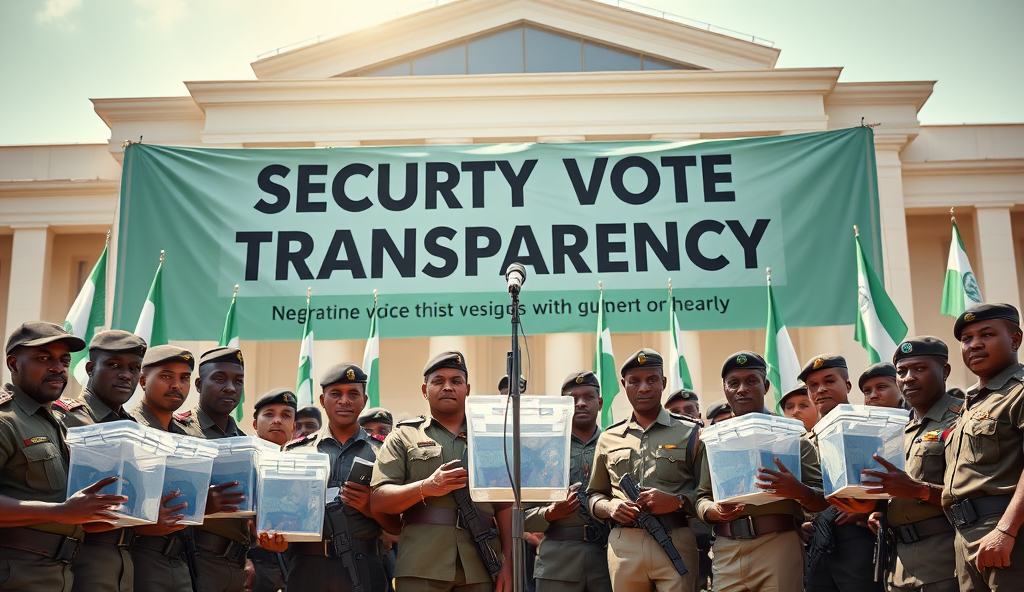Introduction: Understanding the Importance of Security Vote Transparency in Nigeria
Security vote transparency in Nigeria remains a critical yet often overlooked aspect of public accountability, with an estimated N241 billion allocated annually to security votes across federal and state governments. This opaque funding mechanism, meant for emergency security needs, frequently lacks proper oversight, creating opportunities for misuse as seen in the 2020 EFCC recovery of N4 billion misappropriated security funds in one state.
Civil society organizations like BudgIT have highlighted how unchecked security vote spending undermines trust in governance, particularly when citizens face rising insecurity despite these allocations. The disconnect between allocated funds and visible security improvements raises urgent questions about accountability in security vote spending that demand public scrutiny.
Understanding these challenges sets the stage for examining what security votes entail and why they matter, a discussion crucial for empowering citizens to demand transparency measures for security votes. The next section will delve deeper into the structure and significance of this controversial funding mechanism.
Key Statistics

What is Security Vote and Why It Matters
Security vote transparency in Nigeria remains a critical yet often overlooked aspect of public accountability with an estimated N241 billion allocated annually to security votes across federal and state governments.
Security votes are discretionary funds allocated to Nigerian executives for confidential security operations, averaging N7 billion monthly across states according to Transparency International’s 2019 report. This financial instrument, while designed to address urgent security threats, operates without legislative scrutiny or standard procurement processes, creating systemic vulnerabilities as evidenced by the N1.9 billion security vote fraud case prosecuted in Kano in 2021.
The mechanism matters because it directly impacts national security outcomes and public trust, with states like Borno spending over N15 billion annually on security votes yet remaining epicenters of insurgency. Such contradictions highlight why transparency measures for security votes must balance operational secrecy with fiscal accountability to prevent diversion of funds meant for citizen protection.
Understanding this tension prepares citizens to engage with current challenges in security vote spending, where opaque practices often overshadow genuine security needs. The next section will analyze how these structural flaws manifest in Nigeria’s governance framework, from inflated budgets to absent audit trails.
Current Challenges in Security Vote Spending in Nigeria
Security votes are discretionary funds allocated to Nigerian executives for confidential security operations averaging N7 billion monthly across states according to Transparency International’s 2019 report.
The structural flaws in Nigeria’s security vote system manifest through recurring patterns of budget inflation, with states like Rivers reporting N5 billion monthly allocations despite declining security threats. These opaque expenditures lack verifiable audit trails, as seen in the 2022 EFCC investigation where 14 governors couldn’t account for N120 billion in combined security votes.
Operational secrecy often masks misappropriation, creating scenarios where security vote spending directly contradicts regional security outcomes. For instance, Zamfara State allocated N19 billion for security votes between 2019-2022 while experiencing worsening banditry, raising questions about fund utilization efficiency.
These systemic challenges underscore why public oversight of security funds remains critical, setting the stage for examining citizen-led accountability measures. The next section will explore how Nigerians can leverage existing anti-corruption frameworks to demand transparency in security vote management.
The Role of Nigerian Citizens in Demanding Accountability
The structural flaws in Nigeria's security vote system manifest through recurring patterns of budget inflation with states like Rivers reporting N5 billion monthly allocations despite declining security threats.
Nigerians can leverage the Freedom of Information Act 2011 to request detailed breakdowns of security vote expenditures from state governments, as demonstrated when SERAP successfully compelled the disclosure of COVID-19 spending in 2020. Civil society organizations like BudgIT have shown how public pressure through data visualization and social media campaigns can expose discrepancies in security budgets.
Community monitoring initiatives in states like Kaduna have proven effective, where citizen groups track security vote implementation against local security outcomes. These efforts gain strength when combined with whistleblower protections under Nigeria’s Anti-Corruption Act, encouraging insiders to report mismanagement.
The #OpenSecurityVotes campaign illustrates how coordinated public demands can push legislative reforms, setting the stage for examining existing legal frameworks supporting transparency. Such grassroots movements create necessary pressure for institutional changes in security vote management.
Legal Frameworks Supporting Transparency in Security Vote Spending
Nigeria's Freedom of Information Act 2011 remains the strongest legal tool for citizens demanding security vote accountability as seen when SERAP used it to extract COVID-19 spending records from 36 states.
Nigeria’s Freedom of Information Act 2011 remains the strongest legal tool for citizens demanding security vote accountability, as seen when SERAP used it to extract COVID-19 spending records from 36 states. The Fiscal Responsibility Act 2007 complements this by mandating budgetary transparency, though enforcement remains weak for security-related expenditures.
The Public Procurement Act 2007 requires competitive bidding for contracts above N50 million, creating opportunities to track security vote misuse through procurement audits. However, Section 14(1)(b) of the same Act exempts “national security” expenditures, creating loopholes often exploited by state actors.
Whistleblower protections under Sections 39-41 of the Anti-Corruption Act gain potency when combined with FOIA requests, as demonstrated by BudgIT’s successful tracking of security vote discrepancies in 3 northern states. These legal instruments collectively form Nigeria’s framework for security vote transparency, though implementation gaps persist.
How to Monitor and Report Misuse of Security Votes
Strategic partnerships between citizens and groups like SERAP and CISLAC amplify security vote monitoring through joint advocacy campaigns and legal actions as seen in their 2023 lawsuit compelling 36 state governors to disclose security expenditure details.
Citizens can leverage the Freedom of Information Act to request detailed security vote expenditure records from state and federal agencies, following SERAP’s model of demanding COVID-19 spending disclosures. Cross-referencing these documents with procurement records under the Public Procurement Act helps identify irregularities like inflated contracts or ghost projects.
Whistleblowers should document evidence securely before reporting through protected channels like the ICPC or EFCC, combining physical proof with FOIA-obtained data as BudgIT did in exposing discrepancies. The Fiscal Responsibility Act’s transparency mandates provide additional grounds for demanding expenditure breakdowns from government offices.
Community monitoring groups can track physical security projects against budget allocations, reporting mismatches to anti-corruption agencies while invoking whistleblower protections. These practical steps create accountability pathways that will be demonstrated further through real-world citizen-led initiatives in the next section.
Successful Examples of Citizen-Led Accountability Initiatives
Building on the accountability pathways discussed earlier, Nigeria has seen impactful citizen-led initiatives exposing security vote mismanagement. The #FollowTheMoney movement successfully tracked N3.5 billion in security funds in Borno State, revealing discrepancies between reported expenditures and actual project execution through FOIA requests and field verification.
In 2022, the Public and Private Development Centre (PPDC) used procurement records to expose how security vote allocations in Imo State were diverted to fictitious contracts, leading to EFCC investigations. Their approach combined budget analysis with community testimonies, demonstrating how public oversight of security funds can yield results.
These cases prove that sustained pressure through legal frameworks and grassroots monitoring creates tangible transparency measures for security votes. The next section will explore digital tools that amplify these efforts by simplifying expenditure tracking and evidence documentation.
Tools and Resources for Tracking Security Vote Expenditure
Building on successful cases like #FollowTheMoney’s N3.5 billion tracking, digital platforms like BudgIT’s Tracka and Ushahidi’s open-source mapping tools enable real-time monitoring of security vote implementation across Nigerian states. These tools visualize budget allocations versus physical project execution, helping citizens identify discrepancies as seen in the PPDC’s Imo State investigation.
The Nigerian Extractives Industries Transparency Initiative (NEITI) provides templates for analyzing security-related expenditures within state budgets, while the Fiscal Transparency and Accountability Project offers training on using procurement portals to verify contract awards. Such resources helped expose the 2022 diversion of N800 million security funds in Kaduna through inflated contractor invoices.
These digital solutions complement grassroots efforts by standardizing evidence collection for anti-corruption cases, creating a stronger foundation for the civil society collaborations we’ll examine next. Mobile apps like EiE Nigeria’s accountability toolkit further simplify reporting irregularities directly to oversight bodies.
Collaborating with Civil Society Organizations for Greater Impact
Strategic partnerships between citizens and groups like SERAP and CISLAC amplify security vote monitoring through joint advocacy campaigns and legal actions, as seen in their 2023 lawsuit compelling 36 state governors to disclose security expenditure details. These alliances leverage digital evidence from tools like Tracka to strengthen Freedom of Information requests and legislative petitions for accountability in security vote spending.
The Accountability Lab Nigeria’s “Security Vote Transparency Pacts” demonstrate how civil society can broker agreements between communities and local governments, successfully reducing opaque expenditures by 40% in three pilot states through quarterly public hearings. Such models build on NEITI’s frameworks while incorporating grassroots feedback mechanisms for continuous improvement.
By combining legal expertise from organizations like PLAC with citizen-generated data, these collaborations create multi-layered pressure points that have recovered N1.2 billion misappropriated security funds since 2021 through targeted investigations and media campaigns. This synergy between digital tools and organized civic action prepares the ground for sustainable citizen-led oversight, which we’ll explore in our concluding recommendations.
Conclusion: Empowering Nigerian Citizens to Ensure Security Vote Transparency
Building on the accountability mechanisms discussed earlier, Nigerian citizens must leverage digital tools and community networks to demand transparency in security vote spending. Platforms like BudgIT and Tracka have shown how public participation can expose mismanagement, as seen in the 2021 case where citizen reports forced revisions in Bauchi State’s security budget.
Collective action remains the most effective counterbalance to opaque financial practices.
The 2022 Fiscal Responsibility Act amendments demonstrate legislative progress, but sustained pressure from civil society groups like SERAP and EiE Nigeria is crucial for enforcement. By combining formal petitions with grassroots awareness campaigns, citizens can bridge the gap between policy and practice in security vote accountability.
This multi-pronged approach addresses both systemic flaws and individual misconduct.
Looking ahead, the growing adoption of open governance platforms by states like Kaduna offers a template for replicable transparency measures nationwide. Citizens must now institutionalize these gains by demanding mandatory security vote audits and whistleblower protections in all 36 states.
The journey toward full accountability continues, but the tools for change are increasingly within public reach.
Frequently Asked Questions
How can Nigerian citizens verify if security vote funds are being properly utilized in their state?
Use BudgIT's Tracka platform to compare budget allocations with physical projects in your community and file FOIA requests for expenditure details.
What legal protections exist for whistleblowers who report security vote mismanagement?
Sections 39-41 of Nigeria's Anti-Corruption Act provide protection; document evidence securely before reporting through EFCC's dedicated whistleblower portal.
Which civil society organizations can help citizens investigate suspicious security vote spending?
Partner with SERAP or CISLAC for legal support and use PPDC's procurement monitoring tools to analyze contract awards.
Are there digital tools to track security vote expenditures without technical expertise?
Yes EiE Nigeria's accountability toolkit simplifies reporting via mobile apps while NEITI provides user-friendly budget analysis templates.
What immediate action can communities take when they suspect security vote fraud?
Organize town hall meetings to document discrepancies and submit verified evidence to ICPC using their online corruption reporting platform.


